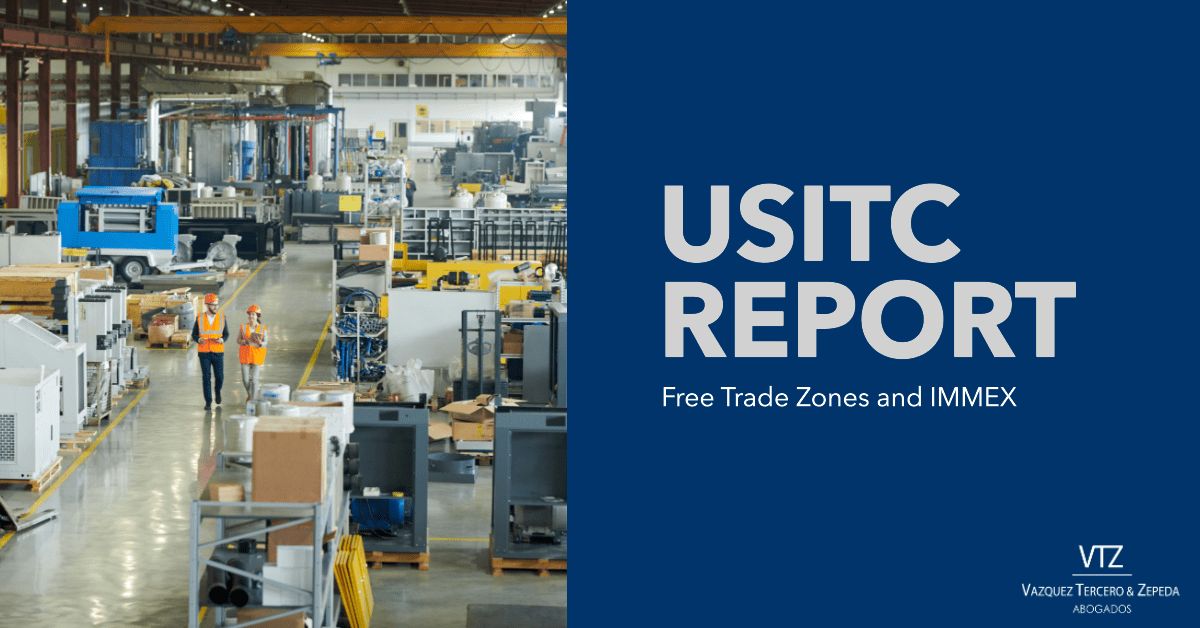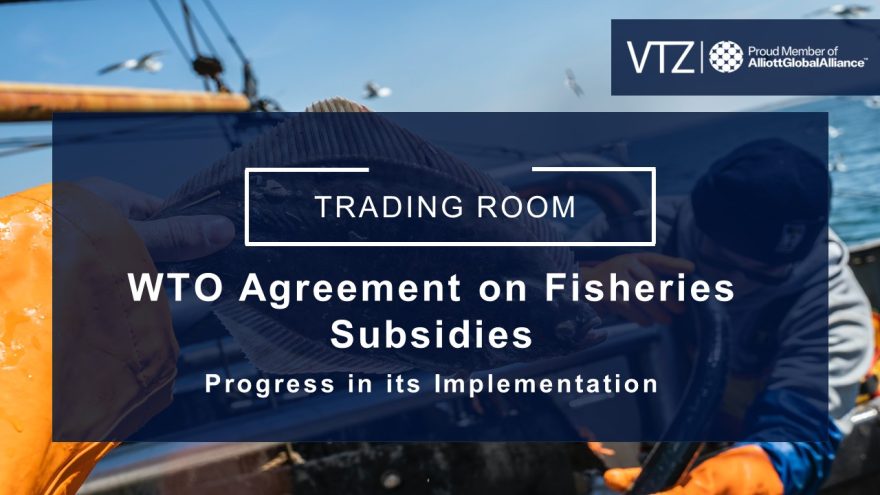USITC Report Results:
IMMEX Customs and Tariff Benefits
On December 14, 2021, Ambassador Katherine Tai, Director of the USTR (Office of the United States Trade Representative), asked the U.S. International Trade Commission to conduct a thorough investigation into policies related to free trade zones in the United States. We reported this previously.
In particular, it focused on reviewing public policies on drawback and tariff deferral in the «Free Trade Zones» programs in the USA, Mexico, and Canada, examining economic aspects such as employment, important sectors and tariff policy.
USITC investigation of free trade zone policies and their implications.
One of the main objectives of this research was to understand why the Mexican IMMEX program offers superior competitive advantages to companies compared to Free Trade Zones in the United States.
Recently, on May 15, 2023, the USITC published the long-awaited report that highlights the customs and tariff advantages of the IMMEX program, including the eighth rule and PROSEC, among other relevant aspects. In addition, the USITC Report analyzed these policies in light of the USMCA (United States-Mexico-Canada Agreement) and restrictions on tariff deferral. In addition, sector research was conducted in five key areas, including:
- Automotive
- Manufacture of upholstered furniture.
- Oil refining.
- Pharmaceutical industry.
- Distribution and storage.
These findings provide a comprehensive view of the advantages and disadvantages of customs and tariff policies, as well as a comparison between IMMEX programs and Free Trade Zones in the United States.
Results of the Report: Nearshoring to Mexico for competitiveness in international trade programs.
As a starting point, the USITC analyzed Mexico’s IMMEX, PROSEC, and Rule Eight programs to verify whether they comply with the USMCA’s tariff deferral rules. In the report, USITC concluded that the IMMEX program complies with the «lesser of the two» rule of USMCA Article 2.5, which was previously in NAFTA Article 303.
Impact of tariff advantages in Mexico on the Free Trade Zones of the United States.
The report compares the effects and benefits of Mexico’s trade programs with those of the United States. Overall, the USITC found that more firms participate in Mexican programs because of tariff savings on raw materials and industrial inputs.
According to the USITC’s survey, 27% of surveyed companies producing in both countries consider the savings offered by Mexican programs are greater than those in the United States. In addition, 23% of these companies indicated that operating in Mexico implies lower production costs than in the United States.
As noted above, USITC studied the automotive and upholstered furniture sectors, analyzing the impacts of these FTZ programs:
Automotive Industry
According to the report, vehicle and auto parts producers are the main users of these programs in Mexico. More than 800 automotive companies participate in PROSEC, including 60 of the 100 largest auto parts producers in North America. In addition, all vehicle manufacturers with plants in Mexico participate in PROSEC.
In terms of production, 3.5 million cars were manufactured in Mexico between 2016 and 2021. In total, Mexico exported nearly twice as many vehicles to the United States and Canada as the United States exported to Mexico and Canada.
According to the USITC, some manufacturers have stopped using U.S. programs, and the surveyed companies indicate that Mexican programs are highly attractive because they reduce or eliminate almost all tariffs on inputs. That’s why most Mexican automotive companies use Mexico’s programs for their competitive advantages.
Upholstered Furniture Industry
The USITC noted that the benefits granted to upholstered furniture manufacturers in the United States may be limited compared to the benefits of those operating in Mexico. Companies in Mexico with programs (IMMEX, PROSEC, etc.) can reduce tariffs on raw materials and also have lower labor costs.
Specifically, the USITC indicates that the hourly wage for furniture manufacturing in Mexico was more than 7 times lower than the average hourly wage for those in the United States. Consequently, some companies have closed their operations in the United States and have gone to Mexico because it is a more competitive destination for the manufacture of furniture for the US market, even citing the New York Times report on Nearshoring to Mexico.
Implications of the USITC Report on International Trade Policy.
In this report, the USITC does not recommend public policy or a program of action. However, we believe that looking at the political context and trade policy in the United States allows us to unravel possible implications. In that regard, USTR has noted that the Biden-Harris administration intends to promote a worker-centered trade policy.
According to the USTR website, trade policy is an essential part of the «Build Back Better» agenda. Trade must protect and empower workers, drive wage growth, and lead to better economic outcomes for all Americans. President Biden’s 2022 Annual Report and Trade Policy Agenda highlights several notable accomplishments over the past year, including USTR’s work to promote sustainable environmental practices in trade policy, enforce existing agreements, improve the resilience of global supply chains, and combat the COVID-19 pandemic.
And this Report, precisely, aims to promote and justify a new manufacturing-labor policy, especially if one refers to USTR’s letter that requests this investigation. This is because the letter directed the USITC to investigate how the policies and practices of the United States and Mexico impact the employment and competitiveness of goods produced in free zones in the United States.
Based on these considerations, the results of the report and the nearshoring phenomena, we believe that the US government could propose legal and regulatory modifications in its internal trade policies related to Free Trade Zones for certain sectors. For example, one change could be to eliminate the tariff policy applicable to goods produced in the Free Trade Zones, taking aspects or practices from Mexico’s IMMEX program or other trade instruments; another aspect could allow goods produced in the Free Trade Zones to qualify as originating for preferential purposes of the USMCA.
For us, there is no doubt that other U.S. trade policies, such as the 232 and 301 measures, have impacted its U.S. industry and supply chains. Interestingly, such policies were expressly excluded from the report at the request of the USTR. The nearshoring or relocation forces were recognized in that report, so the objective and interest of the United States will most likely be to make its manufacturing industry more competitive.
The IMMEX Guide and its customs advantages of VTZ
Finally, VTZ highlights that USTIC used our Doing Business In Mexico guidelines to prepare this report. Our Doing Business in Mexico guides, published in 2020, explain in detail the design and operation of programs to promote the maquiladora industry and the other commercial instruments used in Mexico by the manufacturing industry.
Although the USTIC reveals, in its report, that there is little literature regarding Mexico’s trade policies or programs, USITC cites our guides in 6 footnotes in the section of Introduction, IMMEX and Company Certification Scheme (OAS), appearing on two occasions as a bibliographic reference, to explain the key policies and most common practices in Mexico. Likewise, the «Importing into Mexico» guide published in Thomson Reuters Practical Law, prepared by our partners Adrián Vázquez and Emilio Arteaga, also served as reference material for the purpose of analyzing the competitive implications for the Distribution and Warehousing sector.
These facts reveal that our international trade guides and IMMEX are a reliable reference of information, reaffirming that VTZ and its members are leaders and specialists in the legal practice of foreign trade and customs.
Need more information?
VTZ is a firm specialized in International Trade and Customs with extensive experiences advising companies import permits or licenses, including CITES certifications, in Mexico.

Adrián Vázquez
Managing Partner

Emilio Arteaga
Jr. Partner

Eduardo Zepeda
Partner

Alejandro Martinez
Jr. Partner








